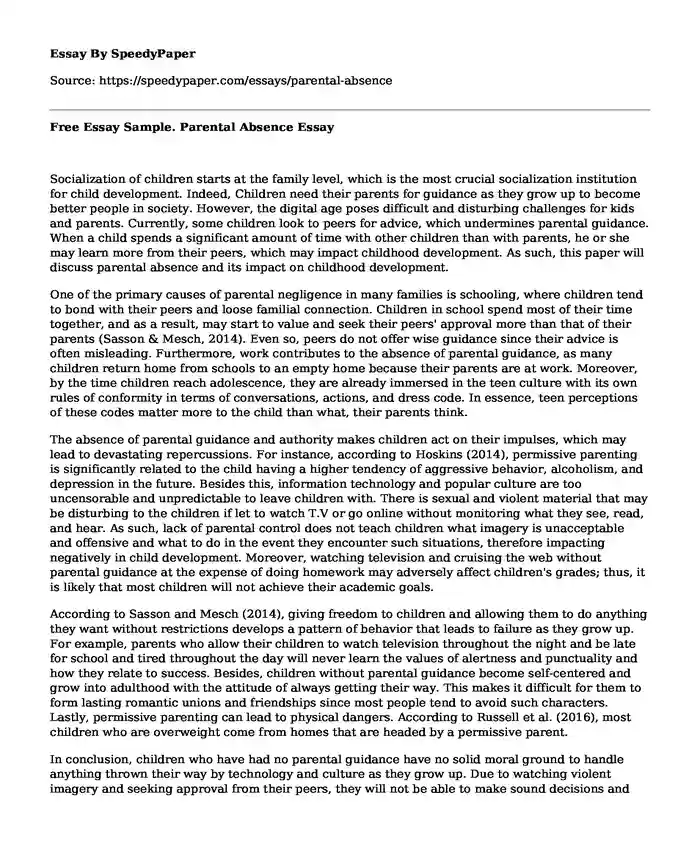
| Type of paper: | Essay |
| Categories: | Parenting Child development Behavior change |
| Pages: | 3 |
| Wordcount: | 743 words |
Socialization of children starts at the family level, which is the most crucial socialization institution for child development. Indeed, Children need their parents for guidance as they grow up to become better people in society. However, the digital age poses difficult and disturbing challenges for kids and parents. Currently, some children look to peers for advice, which undermines parental guidance. When a child spends a significant amount of time with other children than with parents, he or she may learn more from their peers, which may impact childhood development. As such, this paper will discuss parental absence and its impact on childhood development.
One of the primary causes of parental negligence in many families is schooling, where children tend to bond with their peers and loose familial connection. Children in school spend most of their time together, and as a result, may start to value and seek their peers' approval more than that of their parents (Sasson & Mesch, 2014). Even so, peers do not offer wise guidance since their advice is often misleading. Furthermore, work contributes to the absence of parental guidance, as many children return home from schools to an empty home because their parents are at work. Moreover, by the time children reach adolescence, they are already immersed in the teen culture with its own rules of conformity in terms of conversations, actions, and dress code. In essence, teen perceptions of these codes matter more to the child than what, their parents think.
The absence of parental guidance and authority makes children act on their impulses, which may lead to devastating repercussions. For instance, according to Hoskins (2014), permissive parenting is significantly related to the child having a higher tendency of aggressive behavior, alcoholism, and depression in the future. Besides this, information technology and popular culture are too uncensorable and unpredictable to leave children with. There is sexual and violent material that may be disturbing to the children if let to watch T.V or go online without monitoring what they see, read, and hear. As such, lack of parental control does not teach children what imagery is unacceptable and offensive and what to do in the event they encounter such situations, therefore impacting negatively in child development. Moreover, watching television and cruising the web without parental guidance at the expense of doing homework may adversely affect children's grades; thus, it is likely that most children will not achieve their academic goals.
According to Sasson and Mesch (2014), giving freedom to children and allowing them to do anything they want without restrictions develops a pattern of behavior that leads to failure as they grow up. For example, parents who allow their children to watch television throughout the night and be late for school and tired throughout the day will never learn the values of alertness and punctuality and how they relate to success. Besides, children without parental guidance become self-centered and grow into adulthood with the attitude of always getting their way. This makes it difficult for them to form lasting romantic unions and friendships since most people tend to avoid such characters. Lastly, permissive parenting can lead to physical dangers. According to Russell et al. (2016), most children who are overweight come from homes that are headed by a permissive parent.
In conclusion, children who have had no parental guidance have no solid moral ground to handle anything thrown their way by technology and culture as they grow up. Due to watching violent imagery and seeking approval from their peers, they will not be able to make sound decisions and withstand the occasional unsound choices in their teenage. Furthermore, they are more likely to get involved in alcohol abuse and suffer from depression. Consequently, their academic journey of becoming better professionals and impacting positively on society remains a dream, and instead, they end up influencing the community negatively through violence and alcoholism.
References
Hoskins, D. (2014). Consequences of parenting on adolescent outcomes. Societies, 4(3), 506-531. Retrieved from https://www.mdpi.com/2075-4698/4/3/506
Russell, C. G., Taki, S., Laws, R., Azadi, L., Campbell, K. J., Elliott, R., ... Denney-Wilson, E. (2016). Effects of parent and child behaviors on overweight and obesity in infants and young children from disadvantaged backgrounds: Systematic review with narrative synthesis. BMC Public Health, 16(1). Retrieved from https://bmcpublichealth.biomedcentral.com/articles/10.1186/s12889-016-2801-y
Sasson, H., & Mesch, G. (2014). Parental mediation, peer norms and risky online behavior among adolescents. Computers in Human Behavior, 33, 32-38. Retrieved from https://www.sciencedirect.com/science/article/pii/S0747563213004780
Cite this page
Free Essay Sample. Parental Absence. (2023, Mar 04). Retrieved from https://speedypaper.net/essays/parental-absence
Request Removal
If you are the original author of this essay and no longer wish to have it published on the SpeedyPaper website, please click below to request its removal:
- Essay Sample Concerning Advocacy in Education
- Essay Sample on Starbucks Audit Report
- Essay Sample with a Business Plan: Redefining Hydration
- Improving the Health and Wellbeing of the Valley's Teens - Essay Sample
- Essay Example on Crime and Deviance
- Wisconsin Card Sorting Test, Case Study Example
- Critical Analysis Essay on Charles Yu's Hero Absorbs Major Damage
Popular categories




